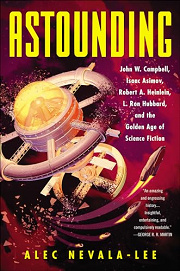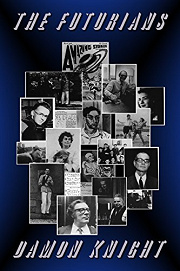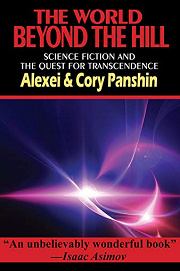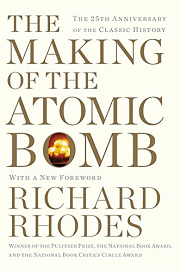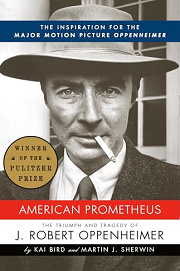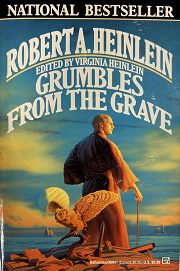Share your thoughts in a quick Shelf Talk!
Astounding: John W. Campbell, Isaac Asimov, Robert A. Heinlein, L. Ron Hubbard, and the Golden Age of Science Fiction by Alec Nevala-Lee
From pulp magazine offices to the birth of modern sci-fi, this riveting history reveals the ambition, brilliance, and contradictions that forged a genre. Astounding: John W. Campbell, Isaac Asimov, Robert A. Heinlein, L. Ron Hubbard, and the Golden Age of Science Fiction is a backstage pass to the myths—and the makers—of science fiction.
Have you read this book? Share what you liked (or didn’t), and we’ll use your answers to recommend your next favorite read!
Love Astounding: John W. Campbell, Isaac Asimov, Robert A. Heinlein, L. Ron Hubbard, and the Golden Age of Science Fiction but not sure what to read next?
These picks are popular with readers who enjoyed this book. Complete a quick Shelf Talk to get recommendations made just for you! Warning: possible spoilers for Astounding: John W. Campbell, Isaac Asimov, Robert A. Heinlein, L. Ron Hubbard, and the Golden Age of Science Fiction below.
In Astounding: John W. Campbell, Isaac Asimov, Robert A. Heinlein, L. Ron Hubbard, and the Golden Age of Science Fiction, did you enjoy ...
... the intertwined lives of early SF writers and fans around Asimov, Pohl, Kornbluth, Merril, and Wollheim, right alongside the Campbell era?
The Futurians by Damon Knight
If you loved how Astounding braided Campbell’s office, Asimov’s submissions, Heinlein’s orbit, and even the Cleve Cartmill FBI dust‑up, you’ll relish Knight’s insider chronicle of the 1939 Worldcon schism, the Wollheim–Moskowitz feud, Pohl’s hustling of stories to Campbell, and Judith Merril’s emergence. It’s the same bustling, gossipy ecosystem—only this time told by someone who was in the room.
... a sweeping, decade‑spanning history of science fiction from Gernsback through Campbell to the New Wave?
The World Beyond the Hill by Alexei Panshin and Cory Panshin
The broad arc you admired in Astounding—from F. Orlin Tremaine handing the baton to Campbell, through WWII and the postwar shifts that nudged writers from Astounding toward Galaxy—gets an even wider canvas here. The Panshins connect Wells, Stapledon, Clarke, Asimov, and Heinlein into one grand narrative, giving you that same panoramic sense of how ideas evolved across generations.
... the wartime scientific ferment that shaped mid‑century SF and stories like “Solution Unsatisfactory” and Cartmill’s “Deadline”?
The Making of the Atomic Bomb by Richard Rhodes
If Astounding’s chapters on WWII—Heinlein’s stint at the Philadelphia Navy Yard, Campbell’s fascination with cutting‑edge physics, and the shockwaves from Cartmill’s bomb story—hooked you, Rhodes gives you the definitive, thrilling deep dive into the science, personalities, and politics that fed those very pages. It’s the intellectual spine behind the era that Campbell and his writers were translating into fiction.
... a nuanced portrait of a brilliant, controversial figure whose choices reshaped mid‑century science and ethics?
American Prometheus by Kai Bird and Martin J. Sherwin
One joy of Astounding is its unsparing look at complicated people—Campbell’s crusades (from championing to souring on Dianetics), Heinlein’s ideological pivots, Asimov’s contradictions, and Hubbard’s reinventions. Oppenheimer’s ascent, the moral quagmire of Trinity, and the wrenching security hearings scratch that same itch for towering, flawed figures whose legacies are both luminous and troubling.
... candid letters and editorial back‑and‑forth that reveal the writer–editor dynamics you saw between Heinlein and Campbell?
Grumbles from the Grave by Robert A. Heinlein
If the editorial trenches in Astounding—Heinlein delivering “If This Goes On—” and “Waldo,” the push‑pull over themes, the postwar recalibrations—were your favorite bits, Heinlein’s letters let you eavesdrop on the process. You’ll see the negotiations behind the fiction, notes from his Navy Yard period, and frank exchanges about projects from Rocket Ship Galileo to the seeds of Stranger in a Strange Land.
Unlock your personalized book recommendations! Just take a quick Shelf Talk for Astounding: John W. Campbell, Isaac Asimov, Robert A. Heinlein, L. Ron Hubbard, and the Golden Age of Science Fiction by Alec Nevala-Lee. It’s only a few questions and takes less than a minute.
